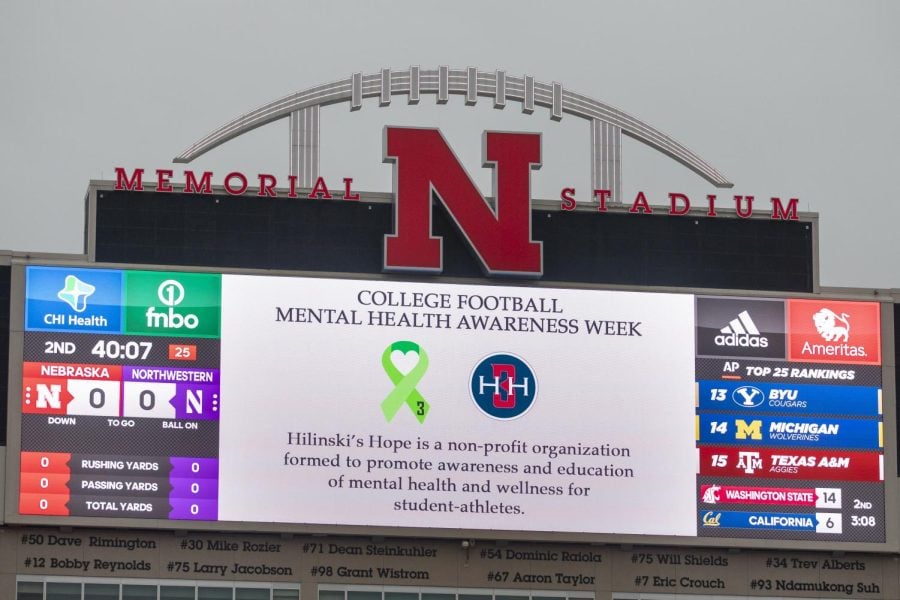Football: Northwestern and Hilinski’s Hope team up to break down mental health stigma
Joshua Hoffman/Daily Senior Staffer
The jumbotron at Memorial Stadium shares a message about College Football Mental Health Week and Hilinski’s Hope. Northwestern participated in College Football Mental Health Week for the first time in 2021.
October 15, 2021
Content Warning: This story contains mention of suicide.
This year, Northwestern participated in College Football Mental Health Week for the first time.
The Wildcats kicked off the week at their Oct. 2 game against Nebraska wearing green ribbon decals and decorating their helmets with No. 3 on them. Then, during the first play of the third quarter, NU’s players held three fingers in the sky. Both were in honor of Tyler Hilinski, brother of sophomore quarterback Ryan Hilinski.
“Having (coach Pat Fitzgerald) address the whole team about raising three fingers in the third quarter, wearing the bands, having these shirts passed out to us really meant a lot to me,” Hilinski said.
Hilinski’s parents, Mark and Kym Hilinski, started College Football Mental Health Week in 2020 as part of their organization, Hilinski’s Hope, which they founded in 2018 after Tyler — a quarterback at Washington State — died by suicide. Tyler wore number three.
The goal of College Football Mental Health Week is to eliminate stigma and increase resources on college campuses and in their athletic departments.
“There’s a Tyler out there somewhere, and we’ve got to find him or her and tell them, ‘It’s okay to ask for help,” Mark said. “It’s our job to provide that place for you.’”
When Tyler was a student at Washington State, the school had no full-time staffers and only one part-time mental health practitioner in the athletic department. Mark said the organization’s priority is to make sure students have adequate resources they can access. One of its goals is to expand from the Power Five into schools that may not have those resources.
Mark said one of the most common concerns he heard from student-athletes was that nothing would change if coaches and athletic directors failed to buy in. Players worried about losing their spot on the field or showing weakness to a coach who might not be forgiving.
“What we hear back from some of the players is, ‘Thank you for doing this, we needed a safe space to be able to talk about this and not worry about losing our jobs, or making our coaches think we’re weak,’” Mark said.
The Hilinski family was cautious about bringing College Football Mental Health Week to NU.
“We didn’t push anybody there to join because we didn’t want it to affect their evaluation of Ryan,” Mark said. “He’s with us, and he helps us and he’s unbelievable, in how he talks to kids and his friends and his teammates, and they’ve been nothing but supportive.”
But after catching wind of the initiatives, coach Pat Fitzgerald reached out to Director of Player Engagement Demetrius Fields and told him he wanted to bring Mental Health Week to NU. Fields reached out to Ryan about partnering with Hilinski’s Hope and said Ryan was very enthusiastic, and brought him informational materials, wristbands and t-shirts.
Fields also worked with Peers Urging Responsible Practices through Leadership and Education (PURPLE), a Northwestern Athletics, student-run organization dedicated to mental wellness.
Fitzgerald was excited by the opportunity to support Hilinski and to use NU’s platform to support mental health, which Fields said they see as a priority for the program going forward.
“We spend all this time weightlifting with coaches,” said junior kicker Trey Finison, a PURPLE executive board member and peer mentor. “(Fitzgerald) also thinks it’s important for us to focus on our mental health, have our psychologist there for the mental aspect.”
Finison started in his role as a peer mentor last year and joined the executive board this year. He and Fields are working together to continue mental health initiatives throughout the academic year, culminating in Mental Health Awareness Month in May.
According to Finison, his role is to be a resource for peers on the team and to educate them about mental health.
“I asked to speak in front of the team a week ago and just explain what PURPLE was, and (Fitzgerald) was ecstatic,” Finison said. “He was texting me in all caps, and he was super happy I was gonna speak about mental health.”
Starting conversations about mental health is one of PURPLE’s main goals, Finison added. Mark said players told him they have spoken with trusted friends and parents and sought treatment because of the conversations they’ve had about mental health.
One of Hilinski’s Hope’s main programs is a Tyler Talk, in which they share Tyler’s story with a team to start a dialogue about mental health and suicide.
“There’s many other things on the plate that we can offer,” Mark said. “At some point, we’ll get to deliver a Tyler Talk to the student athletes at Northwestern, and we’re looking forward to that.”
Email: gabrielacarroll2023@u.northwestern.edu
Twitter: @gablcarroll
Related Stories:
— Football: How Jeremy Meiser became a dominant force on Northwestern’s defensive line
— Football: Bye week gives Northwestern’s offensive line time to ready for Rutgers
— Football: Northwestern welcomes improved Rutgers for Homecoming, looks to rebound from Nebraska



